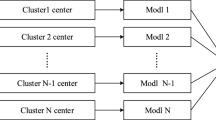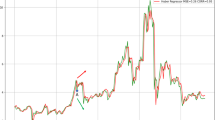Abstract
This paper aims to predict the financial time series. Swarm intelligence algorithms usually use metadata to ensure objectivity without the statistical assumptions of the data. This paper proposed a prediction algorithm integrating multiple support vector regression (SVR) models. The algorithm selects different datasets to train these SVR models. This algorithm also adopts reasonable weights to combine the forecasting results of multiple models to reduce the overall prediction error. The weight of each model is dynamically adjusted according to its recent prediction accuracy. Therefore, this algorithm is adaptive and can deal with nonstationary problems. Five international authoritative stock indexes are used to compare the hybrid SVR model with a single SVR model for performance validation from the perspectives of normalized mean squared error, weighted directional symmetry, and root mean squared error. The results demonstrate that the hybrid SVR model has significantly improved the prediction accuracy and generalization ability of the prediction algorithm compared with a single SVR model. It reveals that selecting the appropriate input vector can achieve an excellent prediction effect.







Similar content being viewed by others
Data availability
The raw data supporting the conclusions of this article will be made available by the authors, without undue reservation.
References
Liu J, Wang S, Zeng X, Jia L, Wang M (2017) Papr reduction in optical ofdm systems based on swarm intelligence algorithms. Acta Opt Sin 37(1):0106006
Bakar MRA, Abbas IT, Kalal MA, Alsattar HA, Bakhayt AGK, Kalaf BA (2017) Solution for multi-objective optimisation master production scheduling problems based on swarm intelligence algorithms. J Comput Theor Nanosci 14(11):5184–5194
Lee J (2017) Optimal power allocating for correlated data fusion in decentralized wsns using algorithms based on swarm intelligence. Wirel Netw 23(5):1–13
Zouache D, Abdelaziz FB (2017) A cooperative swarm intelligence algorithm based on quantum-inspired and rough sets for feature selection. Comput Ind Eng 115:26–36
Ma H, Ye S, Dan S, Fei M (2017) Conceptual and numerical comparisons of swarm intelligence optimization algorithms. Soft Comput 21(11):3081–3100
Wang H, Chen Y, Dong S (2017) Research on efficient-efficient routing protocol for wsns based on improved artificial bee colony algorithm. IET Wirel Sens Syst 7(1):15–20
Lin YH, Hu YC (2018) Residential consumer-centric demand-side management based on energy disaggregation-piloting constrained swarm intelligence: towards edge computing. Sensors 18(5):1365
Chen X, Zheng J, Mei J (2018) Grid connected photovoltaic power generation control method based on swarm intelligence algorithm. Clust Comput 22(2): S4491–S4501
Asaithambi S, Rajappa M (2018) Swarm intelligence-based approach for optimal design of cmos differential amplifier and comparator circuit using a hybrid salp swarm algorithm. Rev Sci Instrum 89(5):054702
Slowik A, Kwasnicka H (2018) Nature inspired methods and their industry applications: swarm intelligence algorithms. IEEE Trans Ind Inf 14(3):1–1
Wang S (2018) Improved swarm intelligence algorithm for protein folding prediction. Clust Comput 22(6):14125–14134
Liu S, Yang Y, Zhou Y, Game DO (2018) A swarm intelligence algorithm-lion swarm optimization. Pattern Recognit Artif Intell 31(5):431–441
Chen YM, Zhu QX, Zeng ZQ, Sun JH, Tang CH (2018) Gene selection method based on neighborhood rough sets and fish swarm intelligence. J Univ Electron Sci Technol China 47(1):99–104
Chen S, Liu Y, Wei L, Guan B (2018) Ps-fw: a hybrid algorithm based on particle swarm and fireworks for global optimization. Comput Intell Neurosci 2018:6094685
Liu J, Wei Y, Xu H (2021) Financial sequence prediction based on swarm intelligence algorithms of internet of things. Comput Econ 5:1–16
Metawa N, Nguyen PT, Nguyen QLHTT, Elhoseny M, Shankar K (2021) Internet of things enabled financial crisis prediction in enterprises using optimal feature subset selection-based classification model. Big Data 2:5–24
Wang E, Jia C, Gang T, Qu P, Lan X, Tao P (2018) Fault detection and isolation in GPS receiver autonomous integrity monitoring based on chaos particle swarm optimization-particle filter algorithm. Adv Sp Res 61(5):S027311771730892X
Hong S, Chen SP, Xu LP (2018) Research on cloud computing modeling based on fusion difference method and self-adaptive threshold segmentation. Int J Pattern Recognit Artif Intell 32(06):1859010
Yan Y, Li J, Li K, Hui F (2018) Cross-docking truck scheduling with product unloading/loading constraints based on an improved particle swarm optimisation algorithm. Int J Prod Res 56(2):1–21
Kim S, Kim J, Chun HW (2018) Wave2vec: vectorizing electroencephalography bio-signal for prediction of brain disease. Int J Environ Res Public Health 15(8):1750
Liu X, Li Y, Wang Q (2018) Multi-view hierarchical bidirectional recurrent neural network for depth video sequence based action recognition. Int J Pattern Recognit Artif Intell 32(10):S0218001418500337
Huang Y, Gao Y, Gan Y, Ye M (2021) A new financial data forecasting model using genetic algorithm and long short-term memory network. Neurocomputing 425:207–218
Jiang P, Nie Y (2020) A hybrid double forecasting system of short term power load based on swarm intelligence and nonlinear integration mechanism. Appl Sci 10(4):1550
Rostami M, Berahmand K, Nasiri E, Forouzande S (2021) Review of swarm intelligence-based feature selection methods. Eng Appl Artif Intell 100:104210
Patel MM, Tanwar S, Gupta R, Kumar N (2020) A deep learning-based cryptocurrency price prediction scheme for financial institutions. J Inf Secur Appl 55:102583
Xu Y, Yang C, Peng S, Nojima Y (2020) A hybrid two-stage financial stock forecasting algorithm based on clustering and ensemble learning. Appl Intell 50(11):3852–3867
Uthayakumar J, Vengattaraman T, Dhavachelvan P (2020) Swarm intelligence based classification rule induction (CRI) framework for qualitative and quantitative approach: an application of bankruptcy prediction and credit risk analysis. J King Saud Univ Comput Inf Sci 32(6):647–657
Nedjah N, Mourelle LDM, Morais RG (2020) Inspiration-wise swarm intelligence meta-heuristics for continuous optimisation: a survey-part I. Int J Bio-Inspir Comput 15(4):207–223
Wang X, Gao J, Chen M, Wei X, Wei Y, Zeng Z (2018) Faulty line detection method based on optimized bistable system for distribution network. IEEE Trans Industr Inf 14(4):1370–1381
Liu J, Shahroudy A, Xu D, Kot AC, Wang G (2018) Skeleton-based action recognition using spatio-temporal lstm network with trust gates. IEEE Trans Pattern Anal Mach Intell 40(12):3007–3021
Ahamed SA, Ravi C (2021) Study of swarm intelligence algorithms for optimizing deep neural network for bitcoin prediction. Int J Swarm Intell Res (IJSIR) 12(2):22–38
Yadav RK, Sivakkumar M (2021) Design framework of stock price forecasting using cascaded machine learning and swarm intelligence. Solid State Technol 64(1):724–738
Acknowledgements
The authors acknowledge the help from the university colleagues.
Funding
This work was supported by IPIS2012, the authors would like to thank the National Social Science Foundation of China (20CZZ017).
Author information
Authors and Affiliations
Corresponding author
Ethics declarations
Conflict of interest
All authors declare that they have no conflict of interest.
Ethical approval
This article does not contain any studies with human participants or animals performed by any of the authors.
Informed consent
Informed consent was obtained from all individual participants included in the study.
Additional information
Publisher's Note
Springer Nature remains neutral with regard to jurisdictional claims in published maps and institutional affiliations.
Rights and permissions
About this article
Cite this article
Gao, Z., Zhang, C. & Li, Z. Financial sequence prediction based on swarm intelligence algorithms and internet of things. J Supercomput 78, 17470–17490 (2022). https://doi.org/10.1007/s11227-022-04572-7
Accepted:
Published:
Issue Date:
DOI: https://doi.org/10.1007/s11227-022-04572-7




